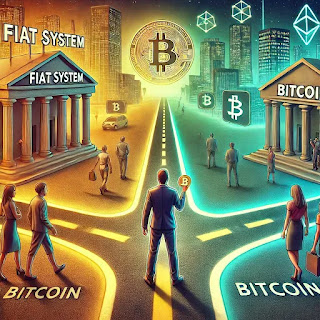Financial Literacy is the Door. Bitcoin is What’s Behind It.
We throw around the term financial literacy like it’s a self-help seminar topic or a line item on some adulting checklist. But let’s cut the buzzwords and break it down: if you don’t understand how money works, you don’t understand the very game you’re being forced to play. And spoiler alert: this game wasn’t designed for you to win.
From the day you're born, you’re handed a currency that someone else controls. You're taught how to earn it, save it, spend it—but never how it actually works. Never why it's constantly losing value. Never who benefits when it does.
The Hidden Curriculum
Schools teach math, but not monetary policy. You learn about Pythagoras, but not Paul Volcker. You memorize dates of old wars, but not the economic wars being waged on you every day via inflation, interest rates, and quantitative easing.
You were told to "save money" as if that's a virtue. But here's the ugly truth: you can’t save your way out of a system designed to make your money worth less over time.
That’s not a bug. That’s the feature.
Inflation isn’t just some background process; it’s a hidden tax on your time. Every dollar printed makes the dollars you worked for worth less. Every stimulus check, every bailout, every war budget padded with borrowed billions—it all adds weight to the same boat we’re all sitting in. And surprise: the people doing the drilling aren’t the ones paddling.
What Financial Literacy Really Means
It’s not just about budgeting or balancing a checkbook. It’s not about knowing your FICO score.
Real financial literacy means knowing that the dollar is debt. That the system runs on ever-expanding credit. That your money isn’t backed by gold, or oil, or unicorn dust. It’s backed by confidence. And that confidence is dying.
And here’s the kicker most people never learned: the only reason we ever dealt in paper money at all was because it was originally a claim check—an IOU for gold. Dollars were receipts. The gold stayed in vaults; the paper was just a promise. But over time, the promise broke. The paper stayed. The gold disappeared.
It means understanding that when interest rates drop, asset prices pump. That the rich don't work for money—they borrow cheap, buy assets, and let inflation pay off their debts. Meanwhile, you’re being told to grind harder while your wages flatline.
It means seeing through the illusion that fiat currency is neutral. It isn’t. It’s a tool—a very old one—used to concentrate wealth and power upward.
Enter Bitcoin
Bitcoin doesn’t make sense to most people at first. Because they haven’t deprogrammed yet. They haven’t looked under the hood of the car they’ve been driving their whole life. They don’t know the brakes are failing and the gas gauge is fake.
But once you do? Once you really understand how broken the current system is, Bitcoin isn’t just interesting. It’s inevitable.
Bitcoin is the antidote to fiat rot. It’s hard money with a known supply. It’s decentralized, transparent, and immune to the whims of unelected bankers. It doesn’t care about your credit score or your passport. It just is.
To truly appreciate Bitcoin, you need to unlearn the myths. You need to see the cage before you can unlock the door.
You Can’t Unsee It
Once you understand inflation, you stop saving in dollars. Once you understand central banking, you stop trusting the news. Once you understand Bitcoin, you stop asking, "Why buy it?" and start asking, "Why didn't I buy more?"
Bitcoin isn’t a rebellion. It’s a revelation.
Financial literacy is the red pill. Bitcoin is the rabbit hole. And down here, we don’t play the game.
We build a new one.




Comments
Post a Comment